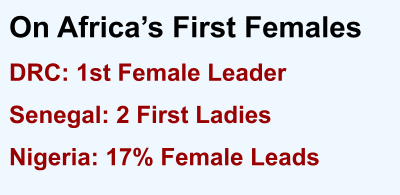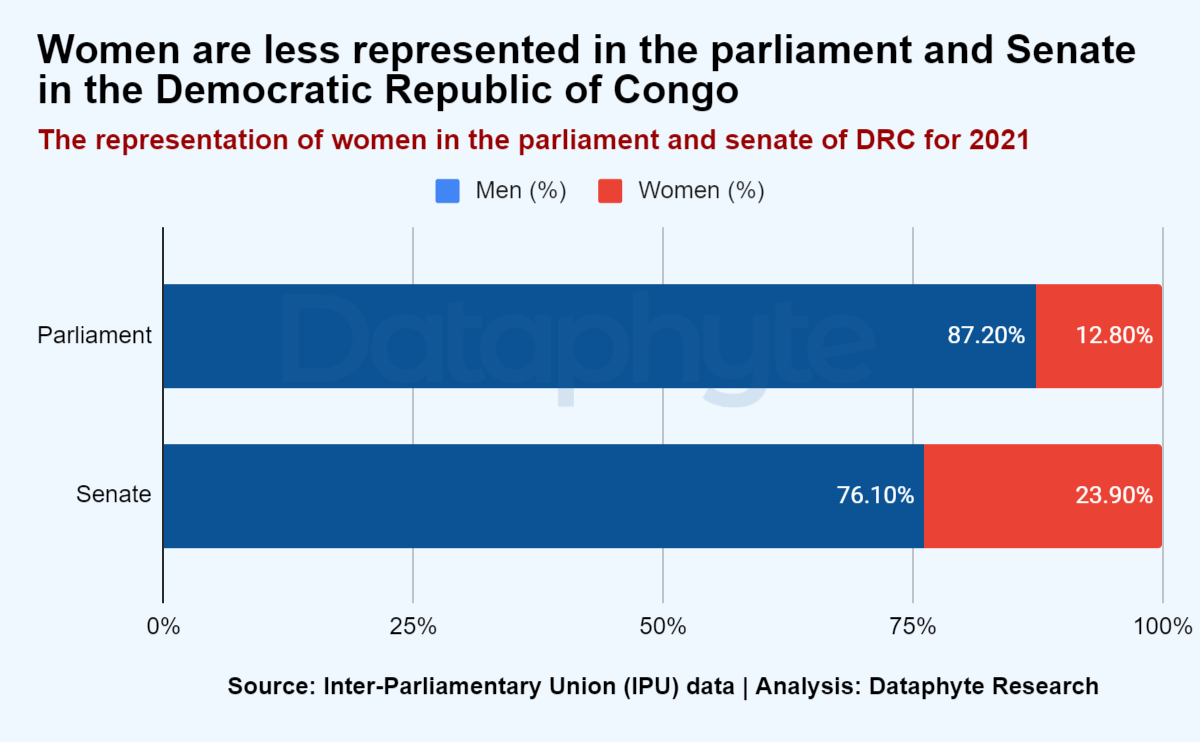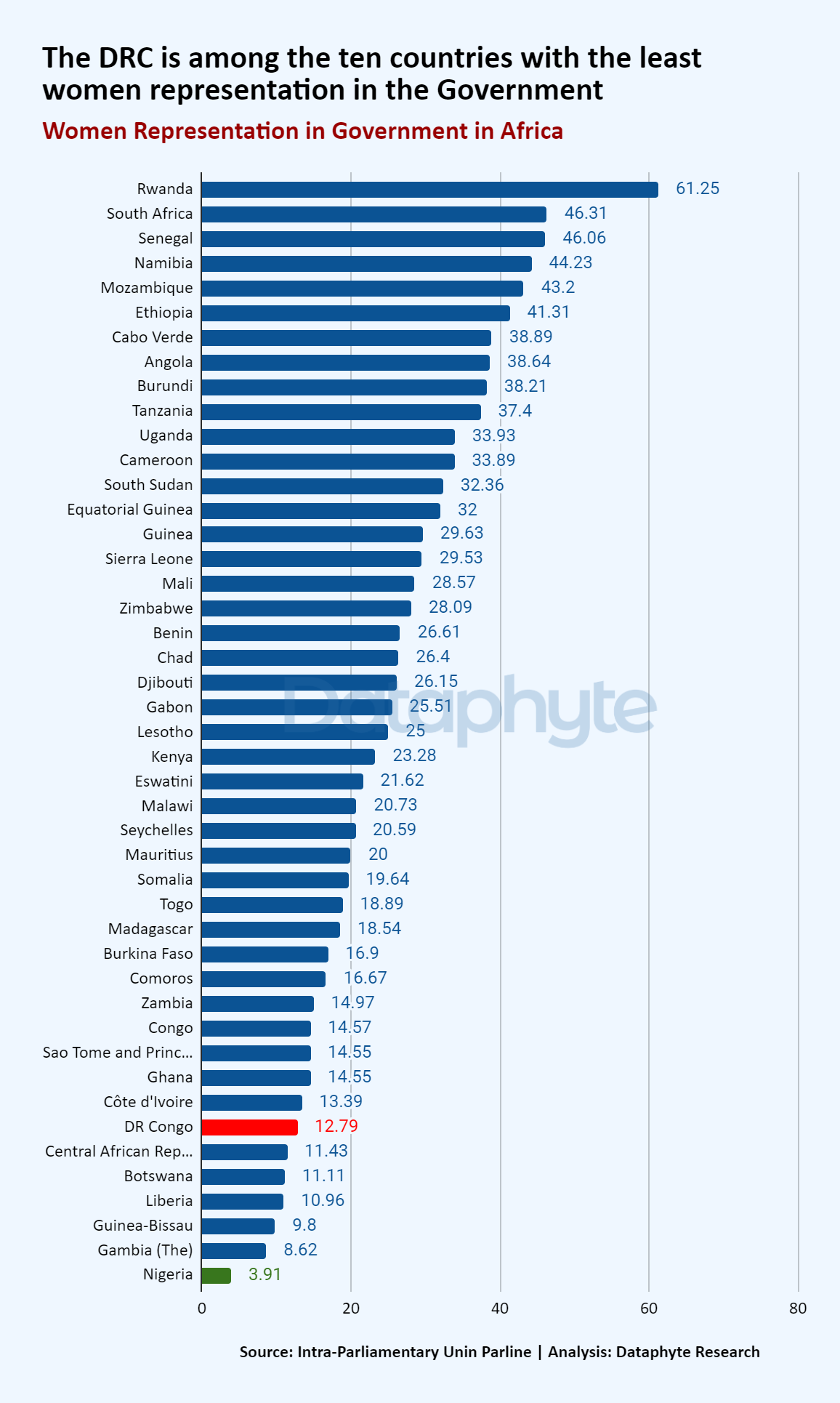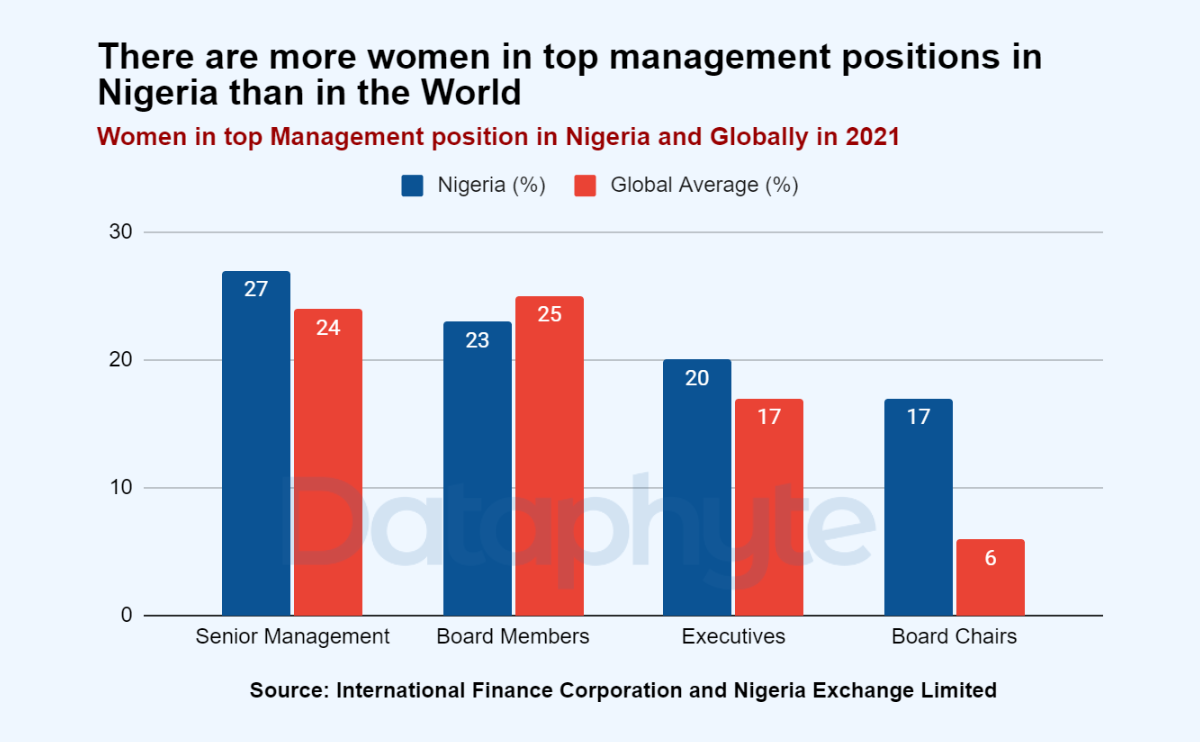There have been so many “firsts” in Africa recently.
President Felix Tshisekedi of the Democratic Republic of Congo (DRC) appointed the country’s first female Prime Minister, Judith Suminwa Tuluka.
It is reported that her appointment is a major milestone for gender inclusivity in politics for DRC and that there is trust in her competence to end the cycle of violence and instability in the eastern region of Congo.
This historic move by the DRC comes at a time when society's views on women's leadership are changing.
This trend in public governance is being amplified in corporate governance, especially in Nigeria, where there are a globally significant number of female chairmen of companies listed on the Nigerian Stock Exchange and an increasing number of female CEOs/ Managing Directors in the Banking sector.
Despite the notable increase in women's leadership in Africa, Congolese women are still underrepresented in politics, and Nigerian women still have a lesser share of seats in corporate governance.
DRC’s Female Leader
The appointment of Judith Suminwa Tuluka as the prime minister of DRC is a notable progress in gender inclusivity for women in DRC. Still, women's representation in Congo’s politics is very low.
The percentage of women in government (parliament and senate) is 14.29%. This is a substantial increase from 8.06% recorded between 2006 and 2010.
In the parliament, women hold 61 of the 477 seats. In the Senate, women hold 26 of the 109 seats.
This indicated that despite the increasing number of women in politics in DRC, they are still under-represented in the country's decision-making process.
According to some of the women activists, the low representation of women in the decision-making arm of government is one of the reasons why women are greatly marginalised in DRC.
"The low representation of women in decision-making bodies is a major factor affecting the consideration given to their specific needs, the allocation of resources and even the formulation of social and economic legal reforms."
"That's why it's important to ensure that women participate at all levels of decision-making so that they can present and defend their rights in our highly patriarchal society," the women's body stressed.
DRC ranked 163 out of 170 in the 2021 Women, Peace and Security Index and 150 out of 162 in the UN's 2020 Gender Inequality Index.
On women’s representation in governance in Africa, DRC is doing better than only six countries, including Nigeria.
Rwanda has the highest number of female government representatives in Africa and globally, while Nigeria has the lowest number in Africa.
Globally, the average percentage of women cabinet members heading ministries is 22.8 %, and only 13 countries have women holding over 50% of cabinet members leading policy areas.
The appointment of their first female prime minister is a win for women and national development in DRC.
Many experts have shown that women’s participation in politics, including representation in an elected government, contributes to the overall well-being of the community/nation.
This implies she might be the right person to steer the country towards stability and prosperity.
Senegal’s First Ladies
There’s yet another female first in Africa.
Bassrou Faye, the first under-45 President of Senegal, has also set a new record as the first polygamous Senegalese president.
While he has not chosen a female Prime Minister like his Congolese peer, he has projected 2 women simultaneously as his first ladies.
As the two ladies emerge as co-first ladies, Mrs Sonko, the Prime Minister’s wife, may have to settle for the third lady of Senegal.
Beyond being the wife of a male leader, first ladies wield a spectrum of influence ranging from soft power, which empowers people, especially fellow women, girls and vulnerable groups, to presumptive powers comparable to elected government officials and appointees.
This is not the first record of a polygamous president in Africa; there was Ancestus Akuku of Kenya, who was reported to have married 100 wives and divorced 30 of them. Some other popular polygamous presidents are Jacob Zuma of South Africa, Teodoro Obiang Nguema of Equatorial Guinea, Omal al Bashir of Sudan, Ismail Omar Guelleh of Djibouti and Muammar Gaddafi of Libya.
Even though these presidents were polygamists, they only projected one of their wives as their first lady.
Some women have outrightly called out presidents involved in polygamous marriages as objectifying women. At the same time, some see it as a good way of showcasing African culture and no longer hiding polygamy.
The position of the First Lady in Africa lacks a clear definition in the constitutions of African countries. Still, she could be one of the most influential parties in the president’s decisions, just as the few First Gentlemen.
Nigeria’s Female Leads
Female representatives in elective public offices are few in Nigeria. The reverse is the case in corporate governance.
A World Bank Report on Gender Equality in the Nigerian Private Sector shows that female management positions in Nigeria are higher than the global average of women who hold executive management positions as board chairs, board members and senior managers.
The report analysed Gender equality in the 30 leading companies listed on the Nigerian Exchange Limited, which are the major corporations in Nigeria.
Nigerian women hold nearly three times the position of Board Chairs (17%) than the global average (6%).
The proportion of women holding managerial positions in Nigeria is also double that of those holding managerial positions globally.
The global percentage of women in managerial positions is 28%, while Nigeria is 57%.
Nigerian Banks are leading in making more women CEOs/ Executive directors than other corporate businesses in the country.
Out of 25 prominent banks in Nigeria,11 have females as their CEOs: Zenith Bank, Access Bank, Fidelity Bank, GTBank, FCMB, Unity Bank, Lotus Bank, Citibank Nigeria, Suntrust Bank, FSDH Merchant Bank and Union Bank.
This implies that women hold 44% of top management positions in the Nigerian banking sector.
One of the major factors attributed to this increasing trend in corporate governance in Nigeria is that more companies are acknowledging the capabilities and significance of women in positively influencing their organisations and driving national economic growth.
A survey conducted by ILO on nearly 13,000 companies in 70 countries shows that companies that practise a culture of gender inclusivity and gender diversity initiatives reported improved business outcomes and profit. 75% of the respondents indicated a 10% to 20% increase in profit.
While Nigeria celebrates its feat of having one of the highest numbers of female leads in corporate governance, it has one of the lowest rankings in female inclusion in the workplace, as measured by the Women, Business and the Law (WBL) Index as of 2021.
This index measures the environment for women’s economic inclusion. It is based on three main indicators: the legal framework, the supportive framework, and expert opinions.
Nigeria was ranked 36th out of 47 countries in Sub-Saharan Africa. The country scored 63.1%, less than Africa’s average of 71% and the global average 76.1%.
This index highlights the factors mitigating the increasing number of women entering the workforce and attaining managerial positions in the Nigerian corporate sector.
Nigeria's WBL scores across different indicators. The best score is 100 (per cent).
Nigeria has one of the worst legal reforms regarding protecting women after childbirth. Most women are given maternity leave without pay or hurried to resume work less than three months after childbirth. There is no law protecting them from being dismissed after returning from maternity leave
On the other hand, they have achieved the maximum score in marriage. It means that no laws obstruct women from getting married or being divorced to get a job or attain a managerial position.
How do we include more women in Leadership Spheres?
Although progress has been made in attracting more women to leadership positions in corporate businesses, much still needs to be done in corporate business and public governance.
In a continent of 54 countries, Africa has only had three elected female presidents and seven interim or acting female presidents.
Also, we have less than 50% of women in the executive and legislative arm of government in 99% of African countries.
For Africans to experience faster development, more women should be encouraged to participate in the decision-making process across the board.
The appointment of Judith Suminwa Tuluka might not be a huge feat in some quarters. Still, it is a great beacon of hope for women in DRC and a sign that Africa is progressing in increasing women's representation in different spaces of influence.
We hope you enjoyed this edition of Data Dives. It was written by Lucy Okonkwo, a budding Economist who hopes to be the first Nigerian female President of the World Bank Group. It was edited by Oluseyi Olufemi, who wishes President Bassirou Faye a peaceful time leading with his two first ladies, Madame Marie Khone Faye and Madame Absa Faye.







